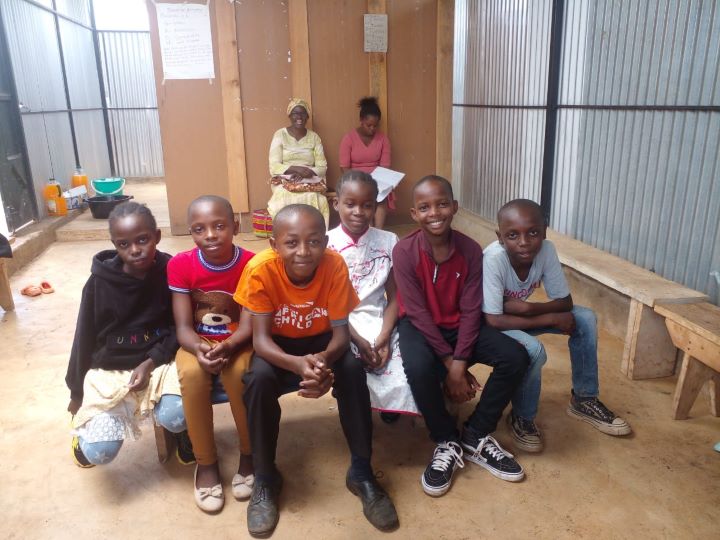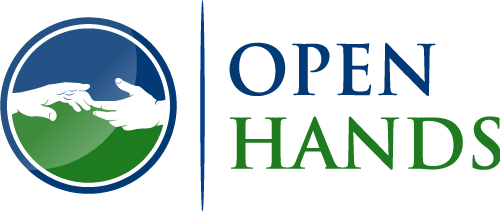A Journey of Faith and Financial Literacy in East Africa
By Thomas Amata, Director of Operations for East Africa
It’s a chilly morning, but some children are braving the cold as they stream into a church building in Taveta town on the Kenyan coast. A few of them are carrying notebooks. They gather around, seated in a circle, talking amongst themselves in audible tones.
When the clock strikes the top of the hour, one of them, who is the president of the group, rises to call them to order. He asks one of them to lead in an opening prayer, and when that is done, he calls on another to lead in singing a chorus. Their voices rise in melodious unison as they sing, offering praises to the Most High God. Then the president asks the facilitator, who is from Open Hands, to teach them the day’s lesson. After the lesson, the president leads them in the money-saving process.
This is typically what happens in all our children’s groups across East Africa. We work in East Africa to help children, youth, and adults combat poverty and build Christian community by forming savings groups, helping them save money while fostering reconciliation in their relationships. We include children because when we train them at a young age, they are less likely to depart from these principles.
At the end of 2023, we had a total of 9 children’s groups with an average of 13 members each. One more has been started this year. In each group, they were saving different amounts given their different abilities. Their savings ranged from 20 cents to $1. At Open Hands, we do not focus on the amount they save, but we rather emphasize the habit of saving and, more importantly, the opportunity to share Christ-centered teachings from our child-friendly curriculum. At the end of last year, some of the children commented that they would rejoin the group because “it is the only opportunity I have to learn the Word of God.”
Most of them were following the ‘Straight Savings’ model. In this model, they save a given amount of money in every savings meeting towards a specific purpose during the cycle without withdrawing any of it. They also do not loan any of it. At the end of the cycle, they receive back their entire savings, which they use to fulfill their saving goals. This approach builds trust among them.
“I want to own a herd of cows, so I am saving to buy chickens,” said John, a child member of a savings group. “I will later sell the chickens to buy goats, which I will also later sell to buy a cow, and that cow will give birth to others,” he continued.
During the formation of these children’s groups, we start by obtaining the consent and support of their parents. Then we help them to form group policies that govern their group. They elect their own officials, including a president, secretary, and treasurer. Our facilitators mentor these leaders, developing them to be servant leaders, and equip them with proper record-keeping skills.
What excites us in working with these children in their groups is that we are helping to raise a generation that doesn’t rely on handouts in a culture where dependency is normal. We are raising a generation that is willing to share, stretching out their hands to give rather than receive. A generation that is willing to delay their satisfaction and consumption, as manifested by a motto for one such group in Swahili that goes “Kula tano, weka tano,” translated as “Eat five, save five.” We remain grateful for your support and prayers.


What is a Person Worth?
by Jason Croutch, Director of Public Relations
How do you measure the worth of a thing? We have an old wooden cabinet that my wife’s grandfather purchased many years ago for 25 cents. It is now worth hundreds of dollars. Publius Sirius, a famous Roman writer and former slave who lived before Jesus, said, “A thing is worth what someone will pay for it.” He spoke from personal experience, where others had determined his value.
So, how do you determine the value of a person? According to one report, the highest paid athlete in the world is a soccer player who earned $136 million last year. President Biden reported $579,514 in income for 2022. That means the highest paid athlete makes almost as much in 1.5 days as the President made all year. Does that make him more valuable than the President?
I’m sure that few of us make as much in a year as the President, let alone famous athletes. But compared to the global poor, who endure extreme poverty, earning less than $2.15 per day, we are all quite wealthy. Does this make us more valuable than they are?
In our world today, if we don’t make as much money as someone else, if we aren’t as famous or important as the president, society says we aren’t as valuable. Many children are taught that they are just the product of billions and billions of years of chance, which means that they have no intrinsic value. They are only as valuable as the money they can earn or the fame or position they can achieve. Sadly, this false idea has been accepted by many of the poor people around the world and, as a result, they believe that they have little or no value because they lack material wealth.
However, at Open Hands, we believe that all people have value because they are created by God in His image (Gen. 1:27), regardless of income or social status. We believe that all of us – including the global poor – have good things to offer to the world. This is one of the foundational principles upon which our savings groups operate and one of the core relationships that we believe must be redeemed by Jesus for all of us to experience wholeness.
Every time I visit one of our savings groups, I am struck by how happy and grateful the members are. Even though they have very little of material value, they are content with what they have and recognize that everything they have is a gift from God. They are not in despair, hopeless, or discouraged. Instead, they are grateful for the help they receive from Open Hands and appreciate the privilege of learning and working together with the other members of their group. They are grateful for the biblical teaching they receive on relationships, running a business, caring for their families, and managing their finances.
In times like these, when so much is uncertain and so many are affected by the disruption that war brings, these vulnerable people need the community and support of the savings groups more than ever! You are a vital part of this ministry, and we thank God for your support and encouragement.
Please pray with us for wisdom and direction as we use the resources God has entrusted into our care. Pray for the members in the savings groups that they would let their lights shine brightly through this time (Matthew 5:16). Many of you reading this newsletter have partnered with us through your financial contributions to this ministry: we greatly appreciate that! Without your support, this ministry could not care for those experiencing the poverty of broken relationships!
I am excited to see how God will continue to use the ministry of Open Hands to build His church! I pray God’s blessing on each of you reading this article! May we all continue to be ministers of reconciliation (2 Cor. 5:18) so that more and more people will be reconciled to God – for His glory.

